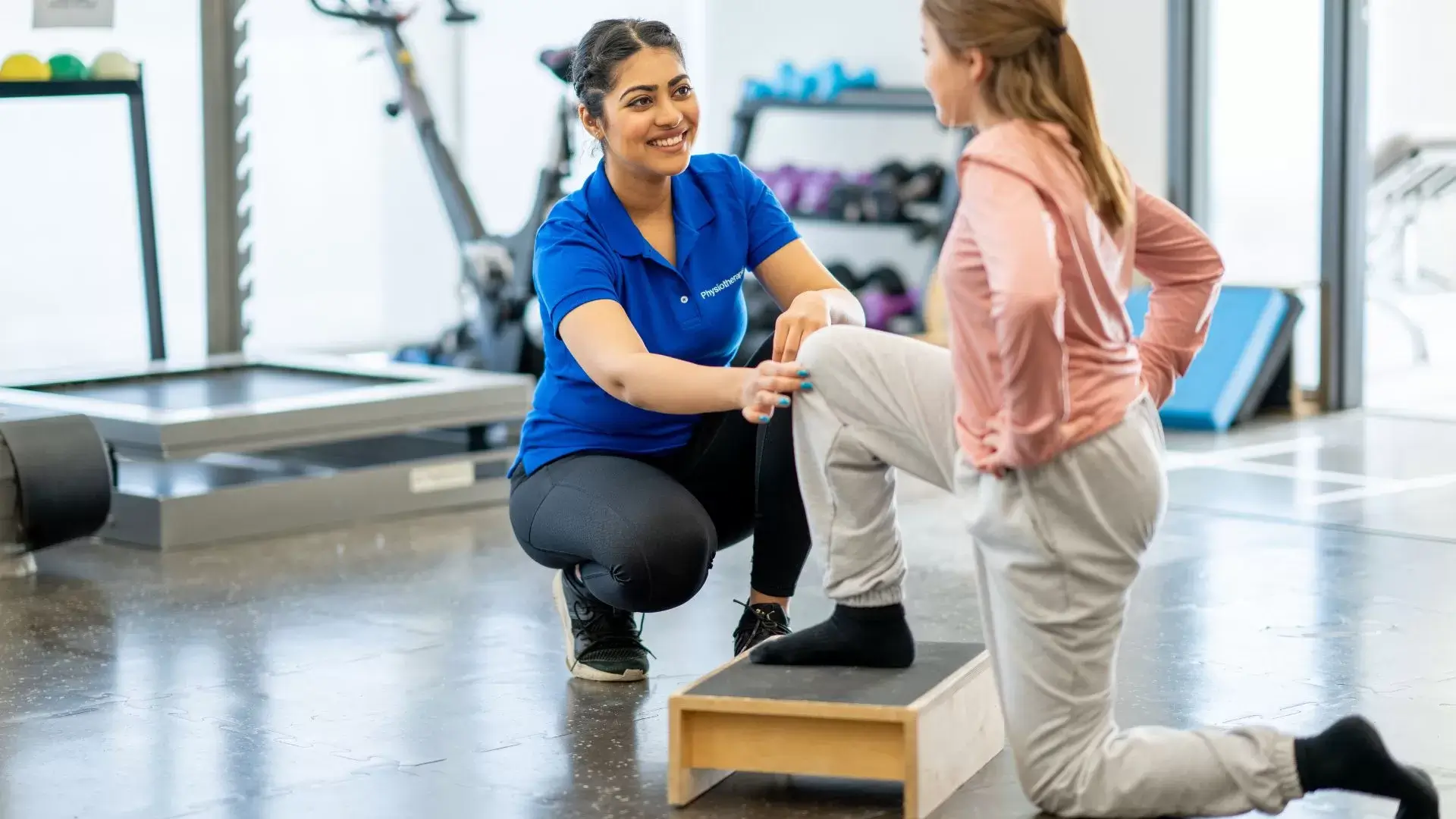We recognize that physiotherapy plays an essential role in managing arthritis effectively. Through personalized treatment plans, we focus on gentle yet targeted exercises to improve mobility and reduce pain. Our approach includes education on body mechanics and self-care techniques that empower you in your journey. We aim to enhance your overall well-being by addressing both physical and emotional aspects of arthritis management. Regular sessions can help alleviate stiffness and minimize flare-ups, allowing you to maintain an active lifestyle. There’s a wealth of insights and strategies available that can further support your path to relief and improved quality of life.

At Physio Chiro Clinic, we specialize in tailored physiotherapy and chiropractic services designed to alleviate arthritis pain and enhance mobility. We recognize how debilitating joint pain and inflammation can be, which is why our all-encompassing arthritis treatment plans focus on effective arthritis management techniques.
Our physiotherapy and chiropractic services include personalized arthritis exercises aimed at improving flexibility and strength, allowing you to engage in daily activities with less discomfort. We employ arthritis-friendly exercises that are gentle yet effective, ensuring that our patients experience arthritis pain relief while gradually increasing their mobility.
Through our arthritis physical therapy sessions, we assess each patient’s unique needs and create customized treatment programs that address their specific challenges. Our team employs a combination of hands-on techniques, therapeutic modalities, and educational resources to empower you in managing your condition effectively.
We believe that recognizing the relationship between arthritis and mobility is crucial to enhancing your quality of life. We’re committed to providing compassionate care that not only alleviates symptoms but also promotes a more active, fulfilling lifestyle. Together, we can navigate the journey toward improved joint health and overall well-being.
Arthritis encompasses a range of conditions that affect the joints, leading to pain, stiffness, and decreased mobility for millions of people worldwide. We often encounter various types of arthritis, including osteoarthritis, which typically arises from wear and tear on the joints, and rheumatoid arthritis, an autoimmune disorder that causes chronic inflammation. Psoriatic arthritis, linked to the skin condition psoriasis, also contributes to joint pain and swelling.
Another significant type is ankylosing spondylitis, primarily affecting the spine and pelvis, leading to stiffness and discomfort. Chronic arthritis can manifest in different forms, with inflammatory arthritis being particularly notable for its potential to cause joint damage if left untreated.
Understanding arthritis symptoms—including swelling, tenderness, and reduced range of motion—is vital for timely arthritis diagnosis. We must also recognize the role of genetics in certain types of arthritis, as family history can influence susceptibility to these conditions. By educating ourselves about the various forms and underlying causes of arthritis, we can better support those affected and advocate for effective management strategies.
Physiotherapy offers a valuable approach to managing arthritis symptoms, enhancing mobility, and improving overall quality of life for those affected. By focusing on tailored exercises, we can effectively reduce arthritis stiffness and minimize the frequency of arthritis flare-ups. Engaging in arthritis and exercise not only strengthens muscles but also promotes joint flexibility, making daily tasks easier.
Incorporating arthritis-friendly products into our routines can further support our journey. Physiotherapists often recommend specific arthritis home remedies and stretches that can alleviate discomfort and improve function. Additionally, participating in arthritis support groups can provide us with emotional backing, fostering connections with others who understand our struggles.
We also recognize the links between arthritis and mental health. Managing our weight through tailored exercise regimens can greatly impact our arthritis symptoms, as excess weight places additional stress on our joints. It’s crucial to adopt an arthritis and lifestyle approach that includes mindful movement and healthy habits. By staying proactive and engaged in our arthritis management, we can enhance our well-being and lead fulfilling lives despite the challenges we face.
Crafting personalized treatment plans for arthritis patients is vital, as each individual’s experience with the condition can vary greatly based on factors like age, lifestyle, and specific symptoms. By combining physiotherapy and chiropractic services, we can address both physical limitations and overall well-being.
We recognize that many patients rely on arthritis medications to manage pain and inflammation, but these should be complemented with holistic approaches. Incorporating an anti-inflammatory diet can play an important role in managing arthritis swelling and fatigue. We often recommend specific foods that help reduce inflammation, along with arthritis creams for localized relief.
Additionally, we emphasize the importance of arthritis prevention strategies. Regular exercise, such as arthritis yoga, can improve flexibility and strength, while hot and cold therapy can alleviate discomfort effectively. Tailoring these elements to fit each patient’s needs guarantees a thorough approach that promotes overall health.

When managing osteoarthritis, we employ a range of targeted physiotherapy techniques designed to alleviate pain and enhance mobility. Our approach often includes a combination of exercise therapy, manual therapy, and education about arthritis and aging. We focus on strengthening the muscles around the affected joints, which can help slow down joint degeneration.
In our sessions, we also discuss the importance of incorporating arthritis supplements, such as glucosamine and chondroitin, into your routine. These may provide additional support for joint health. Additionally, we recommend using arthritis braces and arthritis-friendly shoes to improve stability and reduce strain during daily activities.
Understanding the connection between arthritis and stress is essential. We incorporate relaxation techniques and mindfulness practices to help manage stress levels, which can exacerbate symptoms. Complementing our physiotherapy and chiropractic services with ongoing arthritis research allows us to stay updated on best practices and emerging treatments.
While managing osteoarthritis often focuses on strengthening surrounding muscles, addressing rheumatoid arthritis requires a more extensive approach that includes targeted physiotherapy to reduce inflammation and improve joint function. We recognize that rheumatoid arthritis, an autoimmune condition, can impact individuals differently, including arthritis in women and even juveniles suffering from juvenile arthritis.
Through physiotherapy and chiropractic services, we can create tailored treatment plans that address specific needs, such as knee arthritis or hip arthritis. These plans often involve exercises aimed at increasing flexibility, strength, and overall joint mobility. Additionally, we must consider how arthritis affects sleep; managing pain effectively can lead to better rest and overall quality of life.
Physiotherapy plays an essential role in relieving joint pain and stiffness, helping individuals regain mobility and improve their quality of life. Through tailored physiotherapy and chiropractic services, we can address specific types of arthritis, such as hand arthritis, finger arthritis, wrist arthritis, ankle arthritis, shoulder arthritis, and spine arthritis.
Our approach often includes targeted exercises to strengthen surrounding muscles and enhance joint stability, which is vital for managing conditions arising from cartilage damage. We also focus on techniques like manual therapy and modalities to alleviate discomfort. For those considering arthritis surgery or joint replacement, pre- and post-operative physiotherapy can greatly aid recovery and guarantee a smoother shift back to daily activities.
Moreover, we recognize how debilitating joint pain can be and are committed to providing compassionate care that respects individual needs and limitations. Each session is designed to build confidence and empower our clients, fostering a proactive approach to managing their arthritis. By working together, we can develop a thorough plan that emphasizes pain relief, improved function, and a more active lifestyle, enabling us to navigate the challenges of arthritis more effectively.
Understanding the unique challenges faced by young patients with juvenile arthritis is vital, as effective physiotherapy can greatly enhance their mobility and overall well-being. Pediatric physiotherapy focuses on the specific needs of children, offering tailored physiotherapy services that address the symptoms of arthritis in children.
Our approach to arthritis management emphasizes a combination of exercise therapy and pain relief strategies. We recognize that young patients often experience pain and stiffness, which can hinder their ability to participate in daily activities. Through targeted exercise therapy, we help improve mobility, strength, and flexibility, enabling children to engage more actively in their lives.
Moreover, we ascertain that our sessions are engaging and age-appropriate, fostering a positive environment that encourages young patients to overcome their challenges. By incorporating fun activities into physiotherapy for arthritis, we make the process enjoyable, which is vital for maintaining motivation.
As we work closely with families, we empower them with knowledge about their child’s condition and the importance of consistent physiotherapy. Together, we can make meaningful strides in managing juvenile arthritis, ultimately enhancing the quality of life for these young patients.

Arthritis-related fatigue and swelling are common challenges that can greatly impact daily life, making it essential for us to implement effective strategies to address these issues. We often find that physiotherapy plays an important role in managing these symptoms. Through targeted exercises, we can enhance our mobility and reduce swelling, which in turn helps alleviate fatigue.
In addition to physical therapy, incorporating anti-inflammatory options like turmeric for arthritis can provide supplementary relief. Understanding how arthritis and weather can affect our condition is significant; fluctuations in temperature and humidity may exacerbate swelling and fatigue.
For those of us living with arthritis, gout, or lupus, it’s important to recognize that these symptoms can lead to increased disability, making it challenging to maintain our work and daily activities. By establishing a balanced routine that includes physiotherapy, we can improve our energy levels and manage swelling more effectively.
Ultimately, addressing arthritis-related fatigue and swelling requires a thorough approach that empowers us to regain control over our lives while maneuvering the complexities of arthritis. Together, we can adopt strategies that promote well-being and enhance our quality of life.
Regular engagement in physiotherapy can greatly slow the progression of arthritis, helping us maintain joint function and improve our overall quality of life. By incorporating targeted exercises and manual therapy into our routine, we can enhance mobility and reduce stiffness. This proactive approach not only addresses current symptoms but also helps prevent further deterioration of our joints.
At our clinic located at 123 ABC Road, Oakville, Ontario, we offer extensive physiotherapy and chiropractic services tailored to individual needs. We recognize the impact of lifestyle choices, such as arthritis and smoking or arthritis and alcohol, on overall health. Our team is dedicated to educating patients about how these factors can exacerbate symptoms and affect treatment outcomes.
We encourage open discussions about our habits, as making informed decisions can greatly influence our arthritis management. By maintaining consistent physiotherapy sessions, we can effectively monitor our progress, adapt our treatment plans, and empower ourselves to take control of our health. For more information or to schedule an appointment, don’t hesitate to reach us at 111-111-1111. Together, we can work towards a healthier, more active future.
Post-surgical physiotherapy plays an important role in our recovery journey after joint replacement, helping us regain strength, mobility, and confidence in our everyday movements. After surgery, we may experience pain, swelling, and stiffness, which can be intimidating. That’s where a tailored physiotherapy program comes into play, guiding us through each step of the rehabilitation process.
Initially, our physiotherapist will focus on gentle range-of-motion exercises to reduce stiffness and promote circulation. As we progress, they’ll introduce strength-building activities that target the surrounding muscles, crucial for supporting our new joint. We’ll learn proper techniques for walking and moving safely, which not only aids in our recovery but also prevents future injuries.
Throughout this journey, it’s important to communicate openly with our physiotherapist about any discomfort or concerns. Their expertise allows them to adapt our program to meet our unique needs, ensuring we’re making steady progress.
Ultimately, post-surgical physiotherapy empowers us to return to our daily activities with confidence and improved quality of life. Together, we’ll work towards achieving our goals, fostering independence and capability in our movements once again.
Integrating dietary adjustments into our holistic approach can greatly enhance our management of arthritis symptoms and overall well-being. Research shows that certain foods can either exacerbate or alleviate inflammation, making diet a critical component of our strategy.
We should consider incorporating anti-inflammatory foods, such as fatty fish rich in omega-3 fatty acids, leafy greens, nuts, and fruits like berries. These foods help combat inflammation and may reduce pain levels. On the other hand, it’s prudent to limit processed foods, refined sugars, and trans fats, as they can trigger inflammatory responses in our bodies.
Staying hydrated is equally important. Water aids in maintaining joint lubrication, which is crucial for mobility. Additionally, we might find it beneficial to explore dietary patterns like the Mediterranean diet, which emphasizes whole foods and healthy fats, and has been linked to reduced arthritis symptoms.
Lastly, it’s important to listen to our bodies and identify any food sensitivities that may worsen our condition. By taking a thoughtful, personalized approach to our diet, we can create a supportive environment for managing arthritis effectively.
Managing arthritis through dietary changes lays a strong foundation for our overall health, and when it comes to spine arthritis, physiotherapy can play a vital role in enhancing postural health and alleviating discomfort. By addressing both the physical and functional aspects of spine arthritis, physiotherapy helps us maintain ideal movement and reduce the strain on our vertebrae.
In our sessions, we focus on understanding our individual needs, evaluating our posture, and developing tailored treatment plans. Physiotherapists utilize techniques such as manual therapy, modalities for pain relief, and education about body mechanics. These strategies empower us to recognize and correct poor posture, which can exacerbate our symptoms.
Moreover, physiotherapy encourages us to engage in mindful movement, promoting awareness of our body alignment during daily activities. This proactive approach not only alleviates pain but also helps us prevent further complications. As we commit to our physiotherapy journey, we foster a stronger connection between our physical health and overall well-being, allowing us to manage our spine arthritis more effectively. Ultimately, these efforts contribute to a healthier, more active lifestyle that enhances our quality of life.
Finding relief from arthritis pain can often be achieved through a consistent routine of targeted exercises and stretches that enhance flexibility and strengthen the muscles surrounding our joints. By incorporating gentle movements into our daily lives, we can greatly alleviate discomfort and improve our overall function.
We should focus on low-impact activities, like swimming or cycling, which minimize strain on our joints while promoting cardiovascular health. Stretching exercises, such as neck rolls, shoulder stretches, and leg stretches, are fundamental for maintaining flexibility and preventing stiffness. It’s essential we listen to our bodies and never push through pain; instead, we can gradually increase the intensity and duration of our workouts.
Strength training is also important. Using resistance bands or light weights can help us build muscle strength, which provides better support for our joints. Remember, consistency is key, and even short sessions can lead to considerable improvements over time.
Before starting any new exercise routine, it’s always best to consult with a healthcare professional to guarantee our chosen activities are safe and appropriate for our specific condition. Together, we can take proactive steps towards managing arthritis pain and enhancing our quality of life.
Physiotherapy plays an essential role in addressing the unique challenges of arthritis in women and aging populations, helping to improve mobility and reduce pain through tailored treatment plans. We recognize that arthritis can greatly impact daily life, and our approach focuses on individual needs, considering factors like hormonal changes in women and the natural aging process.
In women, arthritis often intersects with hormonal fluctuations, which may exacerbate symptoms. We prioritize exercises that enhance joint stability and flexibility while promoting overall physical health. For aging populations, we acknowledge that the risk of falls increases with decreased mobility, so our strategies include balance training and strength-building activities to maintain independence.
Our physiotherapy sessions also incorporate education about self-management techniques, empowering individuals to take an active role in their care. By fostering a supportive environment, we encourage open communication, making sure our clients feel heard and acknowledged.
Ultimately, our goal is to create a holistic physiotherapy plan that not only alleviates pain but also enhances quality of life for women and seniors living with arthritis. Together, we can navigate the journey toward improved health and well-being.
We’re here to support you on your journey toward relief from arthritis through expert physiotherapy tailored to your unique needs. Our dedicated team understands the physical and emotional toll arthritis can take on your life, and we’re committed to providing personalized care that addresses your specific challenges.
When you reach out to us, we’ll conduct a thorough assessment to understand your condition and goals. Based on this, we’ll design a customized treatment plan that may include exercises to enhance mobility, education on joint protection strategies, and techniques to manage pain effectively. Our goal is to empower you with the tools and knowledge you need to regain control over your daily activities.
We’re just a call or click away. Whether you’re seeking to alleviate discomfort, improve your strength, or simply learn more about managing arthritis, our expert physiotherapists are ready to help. Don’t let arthritis dictate your life—let’s work together to find solutions that make a difference. Contact us today to begin your path to relief and discover how our specialized physiotherapy can enhance your quality of life.
When considering qualifications for a physiotherapist, we should look for a degree in physiotherapy, along with specialized training in musculoskeletal disorders. They should be registered with a professional body and ideally have experience in treating joint conditions. It’s also beneficial if they’ve pursued continuing education in pain management and rehabilitation techniques. This combination guarantees they’re equipped to provide thorough care, tailored to our unique needs and circumstances.
When considering how often we should attend physiotherapy sessions, it really depends on our individual needs and treatment goals. Typically, we might start with sessions once or twice a week, gradually adjusting based on our progress. Our physiotherapist will assess our response to treatment and suggest a tailored plan. It’s important to communicate openly with them about our experiences to guarantee we’re getting the most benefit from our sessions.
When considering any treatment, it’s vital to acknowledge potential risks. In physiotherapy, while generally safe, we might encounter issues like soreness, fatigue, or even worsening symptoms if exercises aren’t tailored to our needs. It’s important to communicate openly with our physiotherapist about any discomfort we experience. By doing so, we guarantee that our treatment plan is adjusted accordingly, helping us achieve the best outcomes while minimizing any associated risks.
When undergoing physiotherapy, it’s essential to balance our regular activities with treatment. We can often continue many of our usual tasks, but we should listen to our bodies and communicate with our physiotherapist. They’ll guide us on modifications that guarantee we’re not overdoing it. It’s all about maintaining our daily life while allowing our bodies to heal. Staying active can be beneficial, but we must prioritize our overall well-being during this process.
When we think about what to wear to our physiotherapy sessions, comfort and ease of movement are key. We should opt for loose-fitting clothes that allow us to stretch and move freely. Breathable fabrics are a good choice, and we might want to wear supportive footwear to enhance stability. It’s also wise to avoid restrictive items, as they can hinder our progress. Dressing appropriately helps us focus on our therapy and achieve our goals.
Reach out to us today to book an appointment or learn more about our services. Our friendly team is here to answer your questions and help you take the first step toward improved health and wellness.
(647) 372-1209

At our Physio-Chiro Clinic, we are dedicated to providing personalized care that addresses the root cause of your discomfort. With a team of experienced physiotherapists and chiropractors, we focus on restoring your mobility, relieving pain, and enhancing your overall well-being.